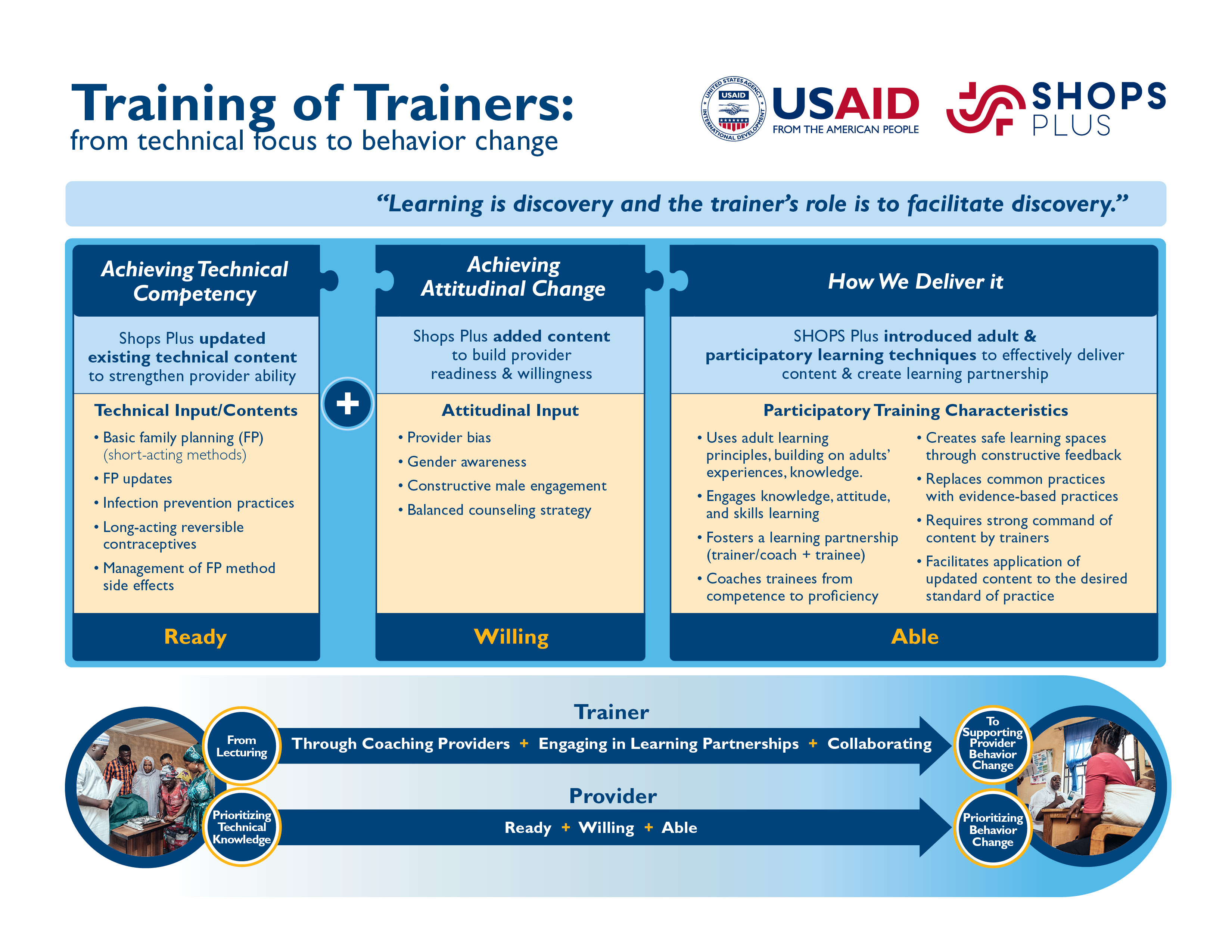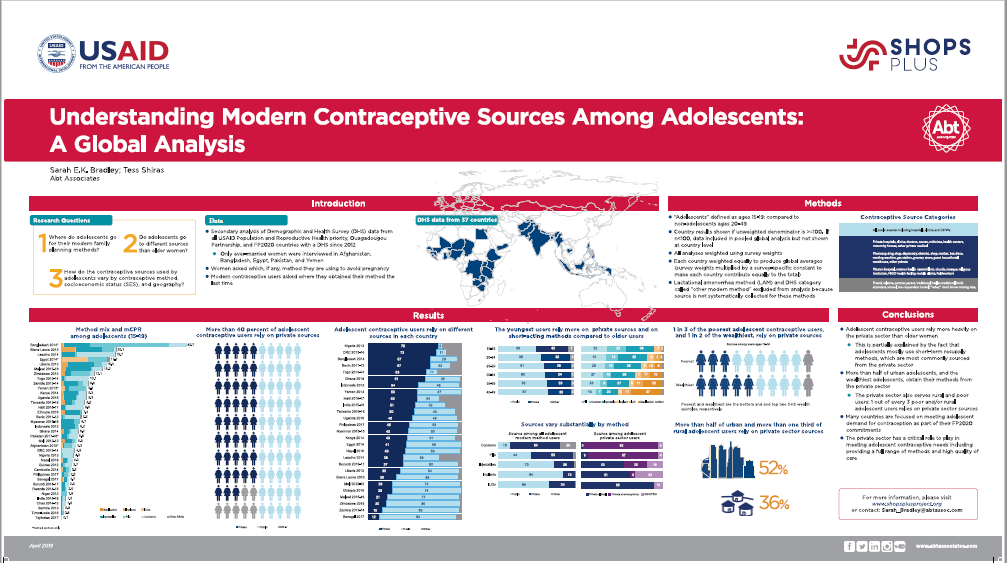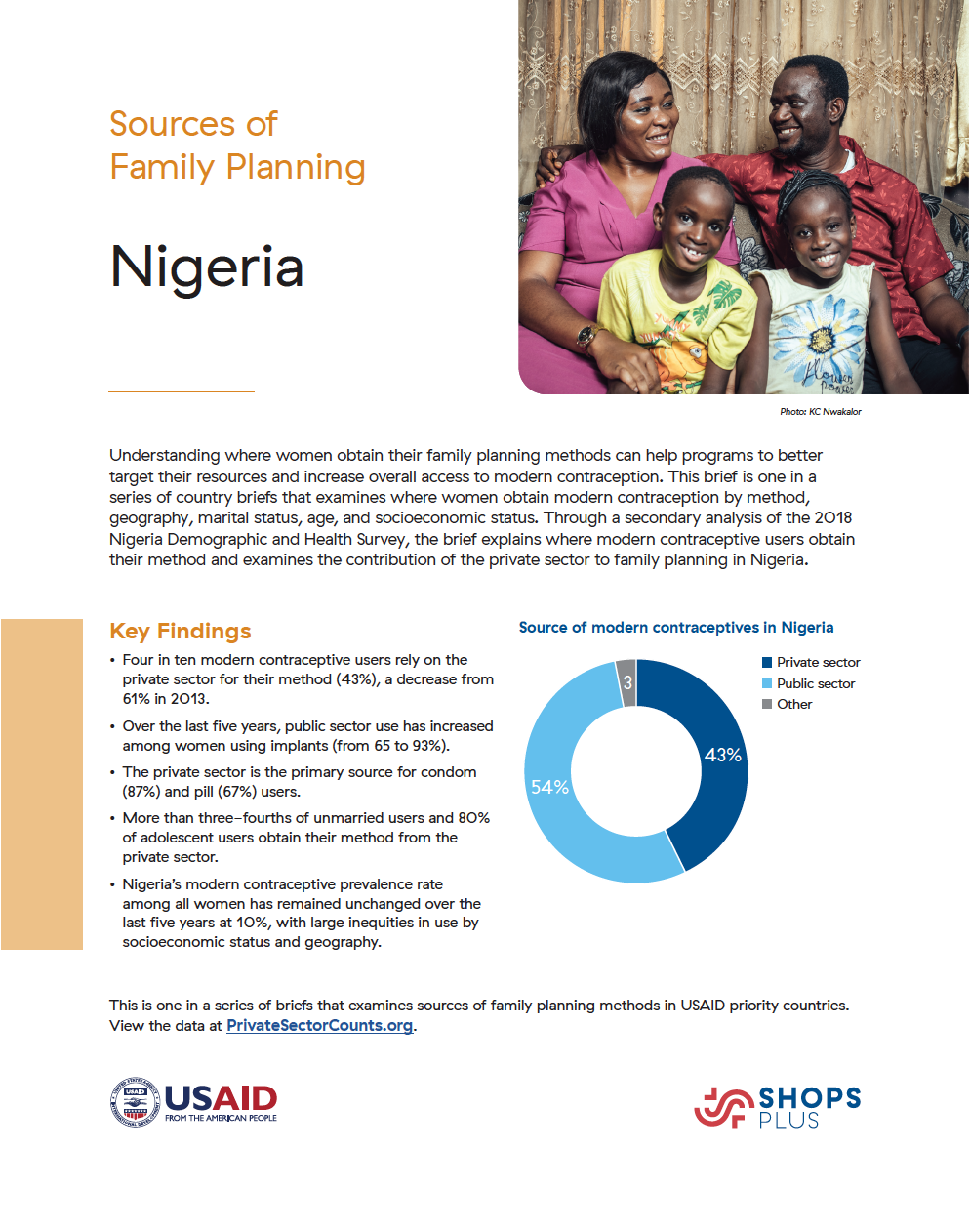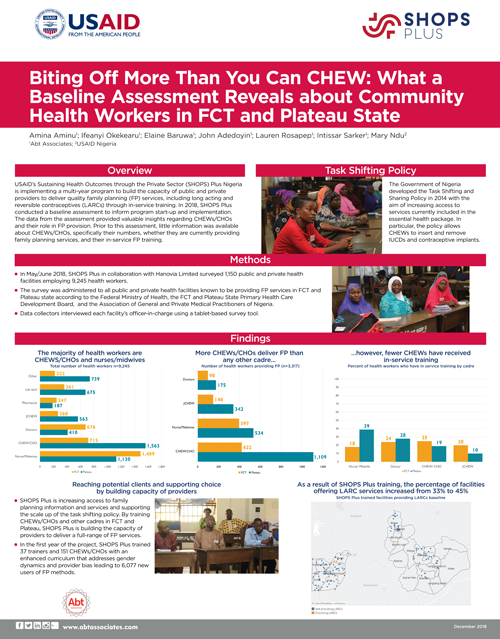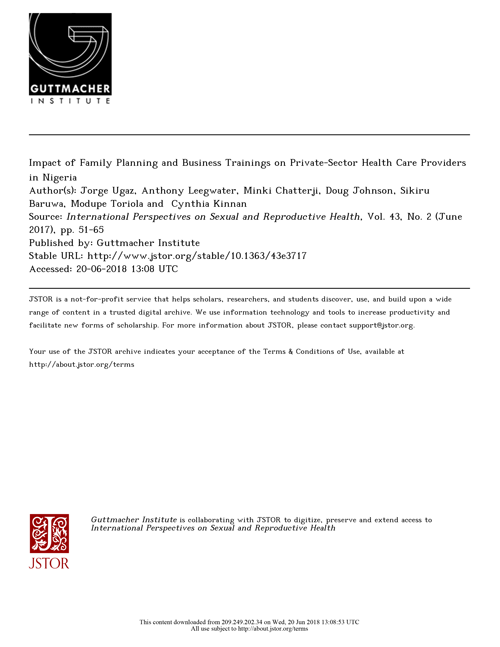
Resource Library
SHOPS Plus Nigeria FP Program State Profile for Akwa Ibom
The SHOPS Plus program in Nigeria worked with the Akwa Ibom state government to increase women’s access to voluntary and rights-based FP services by increasing the capability of public and private health providers to deliver quality FP services, including long-acting reversible contraceptives, and improving the quality of FP service delivery. In Akwa Ibom, the program trained a total of 77 providers, including doctors, nurse/midwives, and community health extensions workers. These providers delivered FP services in 77 facilities, reaching over 7,000 women in six local government areas of Akwa Ibom.
Resource Type : Brief
Country : Nigeria
Year : 2020-03-20T10:30:00
Language : English
Project :

Resource Library
SHOPS Plus Nigeria FP Program State Profile for Federal Capital Territory
The SHOPS Plus program in Nigeria worked with the Federal Capital Territory (FCT) government to increase women’s access to voluntary and rights-based FP services by increasing the capability of public and private health providers to deliver quality FP services, including long-acting reversible contraceptives (LARCs), and improving the quality of FP service delivery. In FCT, the program trained a total of 390 providers, including doctors, nurse/midwives, and community health extensions workers (CHEWs). These providers delivered FP services in 362 facilities, reaching over 87,000 women in all six local area councils (LACs) in FCT.
Resource Type : Brief
Country : Nigeria
Year : 2020-02-19T12:30:00
Language : English
Project : SHOPS Plus

Resource Library
Training of Trainers
Resource Type : Brief
Country : Nigeria
Year : 2019-12-23T09:55:00
Language : English
Project : SHOPS Plus

Resource Library
Addressing Gender in the SHOPS Plus Nigeria Family Planning (FP) Training Program: Experiences from Implementation
Gender can affect how people (especially women and girls) access family planning services in Nigeria; however, providers are often unaware of their own gender biases and lack the skills to address this barrier. The SHOPS Plus program in Nigeria addressed gender as part of family planning training that aimed to improve provider capacity and quality. The program developed an interactive learning approach that focused on trainees identifying how their own bias can be a barrier to their client’s choice, inhibit communication during counseling, and negatively affect the quality of family planning services. The program has worked with the Federal Ministry of Health to incorporate the adult learning approaches and exercises into the national curriculum. This brief documents how trainers and providers have changed their behavior since their training.
Resource Type : Brief
Country : Nigeria
Year :
Language : English
Project : SHOPS Plus

Resource Library
Understanding Modern Contraceptive Sources Among Adolescents: A Global Analysis
The unique contraceptive needs of adolescents are increasingly recognized among the global family planning community. Recent reports on adolescent contraception emphasize the need for high-quality data to inform efforts to increase adolescent contraceptive use, access, and choice. SHOPS Plus conducted a secondary analysis of Demographic and Health Survey data in 37 countries to examine where adolescents obtain their contraceptives, and how sources vary by method and socioeconomic status. The results elucidate the important role that the private sector plays in helping adolescents meet their reproductive intentions: on average, 40 percent of adolescent users rely on private sector sources, with substantial variation by country. Private sector reliance is higher among urban and wealthy adolescents, but the private sector also serves 1 in 3 poor and/or rural adolescent users. Policymakers and program implementers must include the private sector in efforts to successfully meet contraceptive demand and increase access among youth.
This poster was presented by Sarah Bradley at the Population Association of America Annual Meeting on April 11, 2019 in Austin, TX.
Resource Type : Presentation
Country : Bangladesh, Benin, Ethiopia, Ghana, Haiti, India, Kenya, Malawi, Mali, Nepal, Nigeria, Pakistan, Philippines, Rwanda, Sénégal, Senegal, Tanzania, Uganda, Zambia, Zimbabwe
Year : 2019-07-25T14:54:22
Language : English
Project : SHOPS Plus

Resource Library
Sources of Family Planning: Nigeria
Understanding where women obtain their family planning methods can help programs to better target their resources and increase overall access to modern contraception. This brief is one in a series of country briefs that examines where women obtain modern contraception by method, geography, age, and socioeconomic status. Through a secondary analysis of the 2013 Nigeria Demographic and Health Survey, the brief explains where modern contraceptive users obtain their method and examines the contribution of the private sector to family planning in Nigeria.
Resource Type : Brief
Country : Nigeria
Year : 2019-05-31T15:37:00
Language : English
Project : SHOPS Plus

Resource Library
Biting Off More Than You Can CHEW: What a Baseline Assessment Reveals about Community Health Workers in FCT and Plateau State
USAID’s Sustaining Health Outcomes through the Private Sector (SHOPS) Plus Nigeria is implementing a multi-year program to build the capacity of public and private providers to deliver quality family planning services, including long acting and reversible contraceptives through in-service training. In 2018, SHOPS Plus conducted a baseline assessment to inform program start-up and implementation. The data from the assessment provided valuable insights regarding community health extension workers and community health officers and their role in family planning provision. Prior to this assessment, little information was available about community health extension workers and community health officers, specifically their numbers, whether they are currently providing family planning services, and their in-service family planning training. This poster presented at the 2018 Nigeria Family Planning Conference showcases this data.
Resource Type : Presentation
Country : Nigeria
Year : 2018-12-03T11:40:00
Language : English
Project : SHOPS Plus

Resource Library
Engaging Nigeria's Private Health Sector for a Stronger HIV Response
Nigeria’s private sector delivers approximately half of non-HIV health services in the country. However, private provision of HIV services is low. Increasing the number of private providers who deliver the full range of HIV services or improving the reach of and access to private providers who already offer HIV services can help create stronger linkages to care for people living with HIV.
To capitalize on this opportunity, SHOPS Plus conducted a market analysis of supply and demand for HIV services in Lagos and Rivers states. The purpose was to inform a market strategy for engaging and serving people living with HIV in these two states through the private sector.
This brief gives a summary of the market research, divides the market into seven segments, and provides targeted recommendations for each segment.
Resource Type : Brief
Country : Nigeria
Year : 2018-09-16T22:00:00
Language : English
Project : SHOPS Plus

Resource Library
Determinants of Quality of Family Planning Counseling among Private Health Facilities in Lagos
We use a unique dataset that includes an objective measure of the quality of family planning counseling from 927 private health facilities in Lagos State, Nigeria, to determine which variables at the facility and provider levels are most closely correlated with the quality of family planning counseling. Our data on quality come from mystery client surveys in which the clients posed as women seeking family planning counseling. We find that quality is strongly associated with the cadre of provider, with doctors delivering substantially higher‐quality counselling than nurses. Doctors not only outperform nurses overall, but also perform better on each category of quality and spend nearly three minutes longer on average counseling the mystery client. Location, fees charged for the service, and facility type are also strongly correlated with quality. The degree to which a facility specializes in family planning and facility size are only weakly predictive of quality.
This article was published in Studies in Family Planning, Volume 47, No. 3, pages 239-251.
Resource Type :
Country : Nigeria
Year : 2016-08-02T00:00:00
Language : English
Project : SHOPS Plus

Resource Library
Impact of Family Planning and Business Trainings on Private-Sector Health Care Providers in Nigeria
Context
Private health care providers are an important source of modern contraceptives in Sub-Saharan Africa, yet they face many challenges that might be addressed through targeted training.
Methods
This study measures the impact of a package of trainings and supportive supervision activities targeted to private health care providers in Lagos State, Nigeria, on outcomes including range of contraceptive methods offered, providers’ knowledge and quality of counseling, recordkeeping practices, access to credit and revenue. A total of 965 health care facilities were randomly assigned to treatment and control groups. Facilities in the treatment group—but not those in the control group—were offered a training package that included a contraceptive technology update and interventions to improve counseling and clinical skills and business practices. Multivariate regression analysis of data collected through facility and mystery client surveys was used to estimate effects.
Results
The training program had a positive effect on the range of contraceptive methods offered, with facilities in the treatment group providing more methods than facilities in the control group. The training program also had a positive impact on the quality of counseling services, especially on the range of contraceptive methods discussed by providers, their interpersonal skills and overall knowledge. Facilities in the treatment group were more likely than facilities in the control group to have good recordkeeping practices and to have obtained loans. No effect was found on revenue generation.
Conclusion
Targeted training programs can be effective tools to improve the provision of family planning services through private providers.
This article was published in International Perspectives on Sexual and Reproductive Health, Volume 43, No. 2, pages 51-65.
Resource Type :
Country : Nigeria
Year : 2017-06-01T00:00:00
Language : English
Project : SHOPS Plus
Pagination
- Previous page
- Page 5
- Next page


